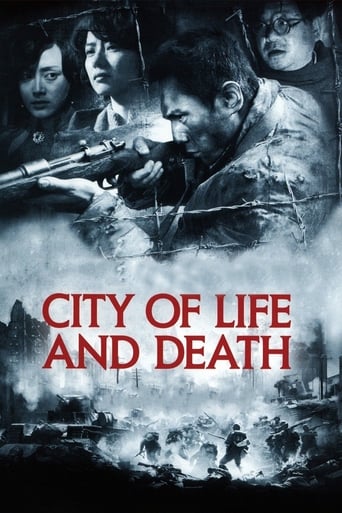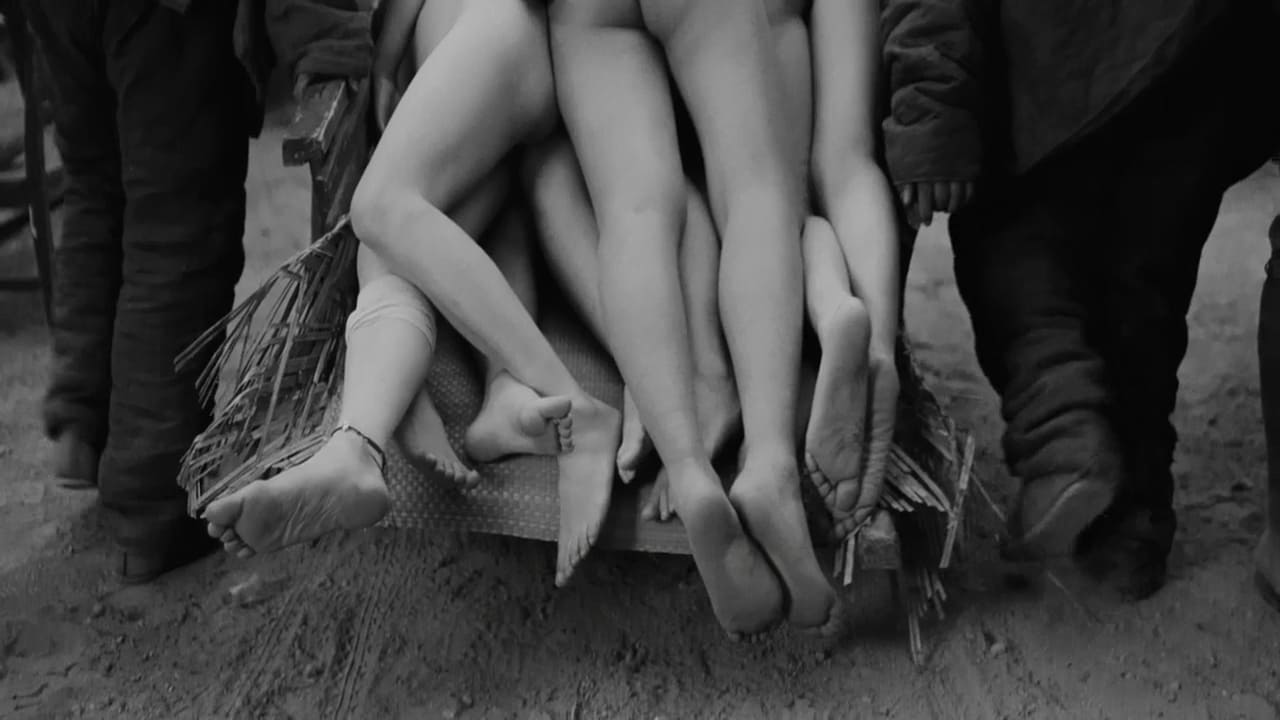sergepesic
There are so many horrors that people inflict upon the other, lesser, people in this world. Of course, to be able to do those atrocious things, you have to somehow dehumanize them or make them less then yourself. And it seems to work for so many inhabitants of this maddening planet. Average, exhausted person tries to block out all the things that don't fit their small, petty existence. We do not know which countries our leaders bombed in last 20 years. That doesn't make us participants in war crimes, but in the same time not every German or Japanese committed the atrocities on Jews or Chinese. They just averted their gaze from the disturbing or unpleasant. Without the passive onlookers, the monsters would be hiding in the sewers where they belong. Alas, courage is a rare commodity and heroes first scapegoats here and everywhere else .
Bambikilled
** The spoilers contained are not really spoilers, just a very brief mention of a couple of scenes**As both a history nerd and a war movie freak, I was rather surprised to discover both a part of history, as well as this movie, and realize that I have hardly heard anything about the rape of Nanking, not by a word mentioned in any history lesson nor school literature in Sweden, where I live. I haven't seen many books about it either, during my years of devouring all literature about WWII and wars in conjunction with it. Sad, but it gave me the more reason to learn about the Sino-Japanese wars. This movie, I guess, was the introduction. The mixed reviews were rather confusing but I chose to go with the general trend, that it was see worthy. It was.Seldom I have been so completely punched down by a Movie, and so utterly engrossed. Everything about this flick just sucks you in, and shakes you up entirely.The black and white execution can, I guess, be a bit different, for watchers not used to old b&w movies, and definitely pretty unusual nowadays. But as I see it, this is one of the most important features of the movie, giving a raw, documentary, and very authentic feel to it. A very smart move by the director, giving the impression that what you are watching, is a piece of naked at-the-scene history. Still, the visual of the movie never loses it's insanely beautiful and powerful cinematography, with every frame In-Your-Face, smashing you like a fist of master photo. The actor portraits are strong, convincing and complex, and lets you feel and wonder, rather than just being fed, evolving and revealing more and more as the story unravels. Some critique Nakaizumi Hideo's rendition of Kadokawa, but I don't get it. IMO he does an amazing job, and makes me believe, and feel, him. Often, western viewers, have a hard time getting used to Asian film, which, according to me, has to do with the fact that western and Asian storytelling and dramaturgy traditionally differ a little bit, which of course is completely natural. In many Asian flicks I think the acting and scripts can feel a bit melodramatic for a western viewer. (Not for me though, as a long time fan of Asian film.) In this movie, however, not a trace of that can be detected. The form of this epic piece of film history, is rather the mellow and minimalistic storytelling of old, classic war drama, like for an example, the excellent Finnish "The unknown soldier" (by Edvin Laine, 1955, about another rather unknown part of WWII - the Finnish wars).The score and sound is also powerful, and adds to the air created, and a couple of scenes are epic, unforgettable, in their perfect harmony of visual, score and emotional strength (the scene with the climb to the top to oversee the field of corpses, and the scene with the ritualistic dance). Scenes that makes one shiver to the core - pure cinematic ecstasy.The story is simple, yet so dense of emotion and complexity, in it's slow pacing leading to a inevitable climax. Never pointing fingers, never glorifying, never picking sides. Just showing the horror of war, naked and raw, never glutting in blood, misery and atrocity, nonetheless giving a deep impact on the Viewer.This movie is NOT overrated by the people calling it a genuine masterpiece, because it IS. A powerful, haunting rendition of a horrific piece of history, with believable portrayals of HUMANS rather than sides. Humans affected by, and changed by, war. Beautifully told in it's awfulness.In a word; fantastic.
beijingpearl2003
Just finished watching this with my husband--he likes war films but has no interest in Chinese culture--I am just the opposite, and will rarely watch a war film but am obsessed with China. We watched "John Rabe" a couple of days ago, and wanted to see the comparison viewpoints.OK, this is my personal opinion only, but I feel that, in spite of the good intentions and honesty of the film, it wandered...there was not really a clear plot and sections were so slow I had to keep my husband from falling asleep--and this is a guy who LOVES war films. The initial scene of the Japanese taking out the guerrilla soldiers in the church is played out excruciatingly, guns popping, little background music, some confusion as to who is who. I kept wondering when the STORY was going to begin. When, about 40 minutes in, we get to meet a few other characters it is a vast relief! We saw this on Netflix and you should know that the subtitles are about 4-5 seconds behind the actual speeches--I speak some Mandarin, but no Japanese, and was constantly irritated at the uncoordinated subtitling. Also, I wanted to see the connections between the characters made more clear; perhaps a title showing where some of the action was taking place would also have been helpful: "Jinling Women's College","Red-Cross hospital",whatever. I also must say that the John Rabe character seemed sort of wussy and did not at all show the kind of strength he actually exhibited (I have read several books on the Nanjing Massacre, Rabe's diary and how others saw him); Minnie Vautrin, who protected so many women and children at Jinling Women's College and personally stood up to Fukuda over the taking of their husbands/sons, etc. was merely a loud-mouthed white woman who seemed in the way at times--in real life,the Chinese women under her care called her the Goddess of Mercy! The role she should have had in the movie was taken by a fictive character called Miss Jiang, probably based on her assistant Mrs. Tsen.Anyone knowing anything at all about the Rape of Nanjing will wonder about the violence in the movie--this is not a gore-fest or a movie where the violence is displayed as a fetish, like in so many modern movies, but yes, it IS realistic, so be prepared. The director does not spare you in showing the atrocities, but the view of them is not drawn out unbearably and the detail is somewhat muted: no brains flying out, no close-ups of splattered heads, but you do see the lengths the Japanese went to, really, similar to an 'ethnic cleansing', and there is one rape scene that is pretty disturbing, but you don't really see much- -it's the emotional impact that gets you. There are also plenty of scenes dealing with the 'comfort women' that the officers insisted on, and, though a few of them were prostitutes already, most were simply women that were chosen for their looks and grabbed unwillingly. There is also a lot of callous violence against the Chinese citizenry that is simply excessive, even for a war.Another mention for those who are, like myself, for whatever reason, China-lovers: one of the main characters is a young Japanese soldier who is seen in an almost sympathetic light, as opposed to the majority of them, who do what they do with pleasure and seem to have no human connection at all, not even to the dazed 'comfort women' they literally rape to death. Mr. Tang, who is a fictive figure representing the Chinese assistant to John Rabe, is another character who does what he can to protect his family, but you may not like how he works, and certainly his karma catches up with him pretty quickly. I understand that the director was trying to see things fairly: not all Japanese soldiers were monsters, not all Chinese were saintly martyrs, but I do think too much time was spent on the 'nice' Japanese soldier. The Westerners in the film needed more development, especially considering they role they played in setting up the Safety Zone and protecting so many Chinese--they seemed superfluous and rather powerless in this movie, and that was unfortunate. Yes, it's a Chinese film, but in purporting to give a truthful presentation of facts, fair is fair and Rabe, Minnie Vautrin, Dr. Robert Wilson and Lewis Smythe were minimized to almost nothing here.The film is slow at times, meandering, has confusing moments and, I think, assumes the viewer is familiar with the history of the era. I believe it needed more dramatic flow, a tighter script, and perhaps more detailed characterizations of the main people; a lot of film footage could have been used better than those first tedious 40-minutes of "battle" time. It is a disturbing film that does show some of the atrocities, but does not go overboard--it is a movie that can be used for enlightenment as well as entertainment of a sort. I still believe a serious viewer needs to do some reading on this subject before they watch, in order to have a sense of what is really going on. Sometimes Chinese movies can be a little maudlin and over-dramatic (though I generally enjoy this!), but there is a good balance in the emotional scenes, and only one towards the end that may be a little much for some people. I did love the Chinese soldiers, just before death, shouting Long Live China!, and there is, even in this intense war film, moments of hope that linger in the heart. I recommend this film to anyone who loves China, who is interested in war, who wants to know some of the real story, who loves intense and honest film-making.
soundchaysa
I was not familiar with the real life story of what happened at Nanjing. It would have been very easy for a director to exploit and over-dramatise this sordid piece of human history, yet Lu Chuan and his wonderful cast have done a fantastic job here.The acting is absolutely top rate. Not a hint of melodrama in sight, nothing overdone and the brutal horror of war, especially that directed at civilians comes across at exactly the right pitch. So much of the story is told simply in facial expressions that the horrors committed in the city did not need to be graphically or gratuitously filmed. Brilliant underplaying by the cast which is surely also a reflection of the directors vision and intelligence.Yes, some of the scenes are violent and brutal, but (at the risk of repeating myself) they simply and in a matter-of-fact way show what people are capable of. The fact that this was done almost as if one were watching a documentary or even as a witness places this film light- years away from the "Let's find heroes and villains" feel of many Hollywood war films.I'm not often moved to rush off and write a review of a film which only shows how moving this work is. I can't give it high enough praise.


 AD
AD



